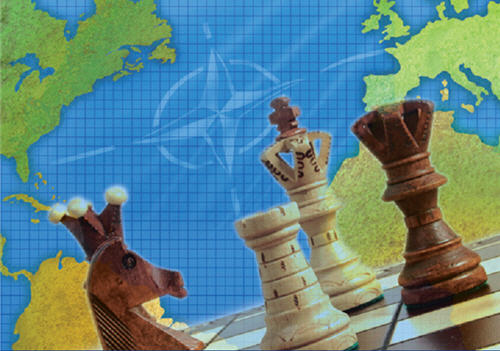
Julian Lindley-French and Yves Boyer have led a Strategic Advisors Group project called STRATCON 2010 to provide provocative ideas and fresh thinking concerning the NATO Strategic Concept.
Download the PDF
Building on the SAG’s April 2010 report ‘STRATCON 2010: An Alliance for a Global Century,’ the project leaders have written this strawman draft of the NATO Strategic Concept to influence the transatlantic debate as heads of state and government prepare to gather for the Lisbon NATO summit in November.
Below is an excerpt from the publication
NATO’s Purpose and Mission
NATO’s enduring purpose is to reaffirm the mutual commitment to the protection and defense of Allies in the event of an attack or threats to security; to demonstrate a readiness to help resolve international crises; and to cooperate with others to resolve common security threats. The Alliance exists to ensure the safety of NATO citizens and their institutions as part of a twenty-first century security alliance and transatlantic security forum that combines and balances political and military power.
NATO’s enduring mission remains to promote stability and security through effective political approaches to conflict prevention and resolution, built on credible military capabilities to support deterrence and provide strategic reassurance to all Allies. The Alliance Strategic Concept is thus central to a new transatlantic relationship relevant and credible in a rapidly changing world.
Why a New Strategic Concept?
In a world of friction NATO remains an essential forum for the discussion of defense and security issues by Americans, Canadians and Europeans who share the same democratic values and commitment to freedom and respect for human rights. To that end, NATO unites the twin North American and European security and defense pillars when vital interests are at risk and provides allies and partners alike a powerful vehicle for influencing the world for the better. Central to NATO’s mission is the need for rapid and effective consultation whenever the territorial integrity, political independence or security of any member is threatened. That duty persists. However, the security and defense context of the Alliance has changed beyond all recognition since the founding of the Alliance in 1949 and the end of the Cold War in 1989. Thus, NATO must seek to be credibly effective in a new and revolutionary strategic age if an open system of free speech, free movement and free trade is to be safeguarded. Such a goal calls not only for a new Alliance strategic concept, but a new type of strategic concept able to speak to and reassure NATO citizens.
NATO’s Enduring and Future Role
NATO is not only a defensive alliance but a cornerstone of stability, not just for the Euro-Atlantic community but the world beyond. Therefore, for NATO to play its full role in an age of austerity, a new affordable balance must be struck between active defense, credible deterrence, both conventional and nuclear, to ensure that risks and threats are kept at strategic distance. Critically, NATO must be seen to be able to act well beyond the transatlantic area. NATO’s strategic role will thus require the further transformation of Alliance strategic and operational planning capabilities, the modernization of NATO’s defense architecture, further reform of the command structure and above all sufficient numbers of deployable armed forces able to go anywhere, fight anywhere and stay anywhere.
NATO & the New Security Agenda
The Strategic Concept reaffirms the security contract at the heart of a political alliance whereby all members gain security in return for the equitable sharing of responsibilities. NATO will of course continue to fulfill its first duty to provide an effective defense for the citizens of NATO members. In addition, NATO will meet the challenges of the new security agenda: combat terrorism, prevent the proliferation of weapons of mass destruction, deal effectively with the consequences of failing states and regional crises, counter the misuse of new technologies, help to provide cyber security, and ensure the flow of vital resources.
Image: stratcon-2010-crop.jpg
